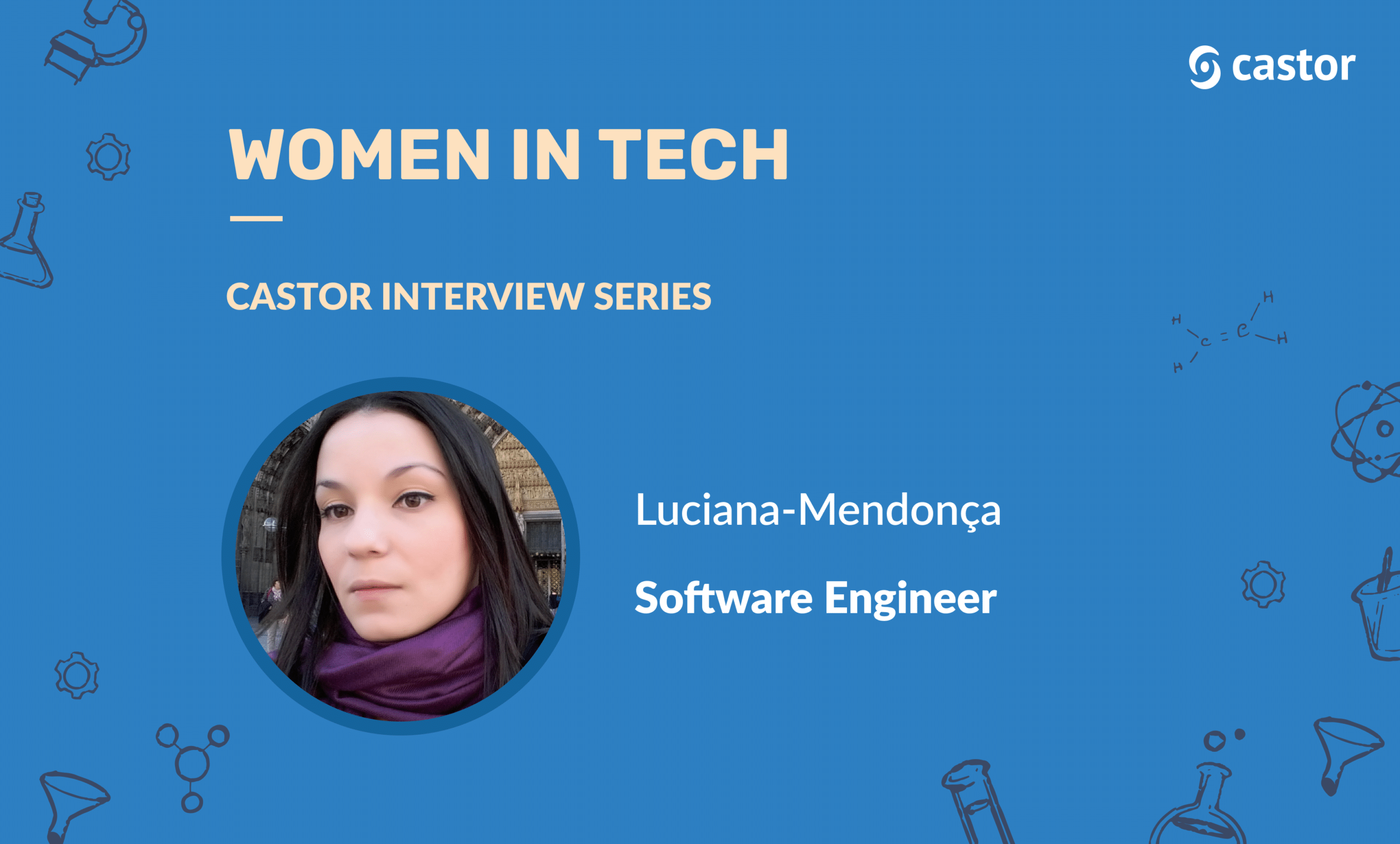
To make medical research smarter and faster, and build top-notch products to support decentralized clinical trials, we pay close attention to diversity & inclusion in Castor’s Product and Engineering teams. Therefore, we’re launching the Castor D&I interview series, where Castorian women in technology share their experiences and thoughts on making the workplace more inclusive. Here is our third episode featuring Luciana Mendonça, Software Engineer at Castor.
When you were little, who did you aspire to become when you grew up?
I had a playful spirit as a kid, and I wanted to be a “warrior,” inspired by Martial Arts and a female character from a medieval TV series (Xena: Warrior Princess). Although I knew deep inside that depicting such a role was pure ideology, I realized later that what I wanted was to become a strong woman and help people.
What got you interested in technology?
I was always fascinated by hardware, video games, arcades, and puzzles, quite often disassembling electronic devices to know how they work internally. I was enrolled in a technical course of Industrial Informatics, focused on programming, hardware, and infrastructure. I thought that I would pursue a computer science path, but I’ve ended up in law school and became a lawyer instead. After many years, I made a career switch to software engineering that enabled me to work on something both personally fulfilling and helping people at the same time.
What is it like to be a woman working in technology for you?
It’s challenging, rewarding, and fun.
It includes overcoming hostile workplaces, communities, and people sometimes. The most challenging aspects of the industry for a woman are dealing with the “well-actually crowd,” who are often well-intentioned but interrupt women whenever they try contributing with an idea.
The fun part of working in technology is using abstractions of a particular domain to extract a new idea or pattern that will eventually become a useful tool for many people. You can make people’s lives easier and accomplish extraordinary things!
Software engineering is for people – all of them, regardless of origin, ethnicity, gender, or economic background. Different human perspectives are very much needed, especially when dealing with AI.
What challenges have you faced in the workplace as a woman working in tech?
As a person who has a significant number of friends and family members in tech, I’m fortunate enough to find support and respect from most of them and among my co-workers. I went through some hostile situations, like having to answer absurd questions that are intrinsically related to my role: “Do you know how to write a function?”, or being mistakenly labeled as something other than a software engineer: “Are you an intern?” and so on. The constant need to prove ourselves in the industry, especially when you have a non-traditional background, is quite tiresome, but it’s not a reason to give up.
Tell us about your current role at Castor.
I work as a software engineer on the Design System, a library consumed by most of the Castor products. I’m also part of the integrations team, doing front-end work for digital patient enrollment. My job is intrinsically related to one of the company’s core values, aiming to amaze our customers through user-friendly and rewarding experiences. Seeing that my work is part of a system that contributes to advancing medical research makes me incredibly proud.
At Castor, we aim towards having a more diverse workplace. What do you think companies can do to encourage more women to choose careers in tech?
There’s an exaggerated glorification of the complexity of working in tech, which makes many people assume that they need to be extra smart, go to the best schools or excel in mathematics to succeed in our field. That’s far from the truth. Determination, discipline, and willingness to learn are the keys to achieve what we want.
When we think about programmers, we quite often picture a man. It doesn’t look like something that a young woman would find easy to emulate. I do believe that the following actions would help improve the gender gap in the technology field and unveil new talents among women: creating more space for women to speak, and being more transparent.
Are there any initiatives at Castor that positively impact the workplace being more diverse and inclusive?
Here at Castor, we have a D&I ambassadors team. They work on the hiring processes and onboarding sessions to ensure that we are welcoming different world views and keeping a sustainable, inclusive culture. We also have a strong Code of Conduct, which states that maintaining ethical behavior is mandatory. Any way of discrimination is not allowed and there’s a system in place to report such actions.
Inclusivity at Castor goes beyond the workplace, as we have a web accessibility policy to ensure digital accessibility for people with disabilities or situational impairment. Front-end engineers and designers are committed, as much as possible, to the Web Content Accessibility Guidelines (WCAG) requirements, making sure that the Castor products are compatible with assistive technologies.
To wrap things up, can you share a fun fact about you?
I’m an avid MMA fan for almost 15 years, having watched thousands of events. I’m like a loud soccer fan while watching: I cheer, shout, cry out of pure joy (or frustration).